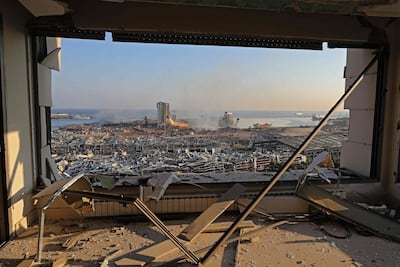Yesterday, US Secretary of State Mike Pompeo declared talks between Israel and Lebanon to agree on their maritime border have failed. The issue has dragged on for decades, however, so despite the breakdown, the very fact talks took place is a diplomatic win for the Trump administration. It also demonstrates the changing politics of Lebanon, in which public frustration is sidelining once-dominant factions, and providing the space for taboo diplomatic issues to be broached, albeit this time unsuccessfully.
The basis of the border dispute is the demarcation lines delineated in the 1949 Armistice Agreement, which led to the establishment of Israel, without defined borders, and decades of struggle to establish a Palestinian state. This year's negotiations began in October, and throughout the process there were multiple rounds of complex talks. At one point in the proceedings, the Israeli Energy Minister, Yuval Steinitz, claimed that the Lebanese side changed its negotiating position seven times.
The fraught nature of the talks comes from a history of bitterness between the two nations as well as the issue's significant strategic implications. For Israel, stabilising relations with Beirut would weaken the Iran-backed militia and political party Hezbollah, which operates from Lebanon. For the Lebanese, resolving the issue would boost their economy at a critical time as the country suffers from inflation, corruption, economic mismanagement and sanctions.

The maritime area under consideration potentially holds as much as 100 trillion cubic feet of gas, as well as 2 billion barrels of oil. These resources can be neither explored nor tapped so long as there is no agreement. And while Israel already has access to its own offshore gas fields, Lebanon is yet to possess such assets. If it did, it could reduce its dependence on imported energy, create much-needed jobs and reduce chronic air pollution.
There are a number of reasons for the talks failing. Both countries have raised the stakes at various points, including Lebanon almost doubling its estimation of the area it lays claim to. Both sides also awarded resource-exploration licenses to private companies as talks were ongoing.
It is possible that they will return to negotiations at some point. However, with fresh Israeli elections expected and Lebanon's political and economic crisis compounding by the day, no one can be sure where both sides will stand next time around. Hezbollah's desire to infiltrate proceedings will remain an obstacle, as it publicly regards any accommodation with Israel to be unconscionable but wants to determine how the talks go. It is also difficult to reach a stable agreement with a Lebanon in which numerous, ideologically opposed factions operate under a banner of deep corruption. Israel has long rejected Lebanon’s rightful territorial claims on the one hand, and on the other suffers from strong political divides and is now expecting new elections.
Openings for a diplomatic solution, however, remain. Public anger for its role in prolonging Lebanon's financial crisis is weakening Hezbollah. The organisation rarely favours diplomacy, so the very existence of these negotiations serves as a rejection, by many Lebanese people, of Hezbollah's usual aggressive tactics.
Mr Pompeo, while acknowledging the ongoing divide between Israel and Lebanon's positions, noted the goodwill displayed by both sides. This must be kept alive to provide the basis for future negotiations. Lebanon is in desperate need of good news, and while no panacea exists for the country, any potential breakthrough could boost the country's energy sector, jobs market, investment prospects and environment.


